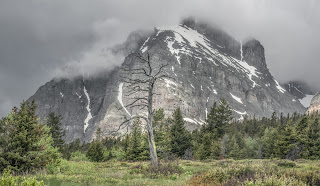
"I start with two proposals. The first:
Landscape is time materialized. Or, better,
Landscape is time materializing: landscapes, like time, never stand still. The second:
Landscapes and time can never be out there: they are always subjective.
The first: In contemporary Western discourse... landscape may be defined in many different ways, but all incorporate the notion of time passing. Thus
landscape as solid geology (as in a granitic landscape, a karst landscape) speaks to evolutionary time, aeons of time: all history in a grain of sand.
Landscape as land form or topography (a desert landscape, a riverine landscape), again, has great time depth but may involve human interventions, human histories. With
landscape as mantled (as in a landscape of peat and moor, a tropical landscape) the processes quicken, sometimes invoking seasonal transience. Landscape as land use (an arable landscape, a country house landscape, a plantation landscape) speaks of things done to the land action and movement, the effects of historically specific social/political/cultural relationships.
...
The time that passes in these scapes is not uniform. Sometimes a linear notion is implied: units of time clipped together, uniformly ticking over as the years, centuries, millennia, and much more, go by.
...
The second proposal follows from the first.
Landscapes and time are not objective, not a given, not neutral... This is not to say that the world does not exist outside of human understanding, of course it does. When we have bombed ourselves out of existence or made the world unlivable for human beings, the world will (probably) still exist and will go on changing. The point is simply that it is we, through our embodied understanding, our being in the world, who create the categories and the interpretations: Human beings cope with the phenomena they encounter by slotting them in to the understanding of the world which they have already developed: nothing is perceived without being perceived as something. If there was no person, there would still be rocks, trees, mountains but no one to recognize them as such or to call them by those names"
- Barbara Bender, Time and Landscape







